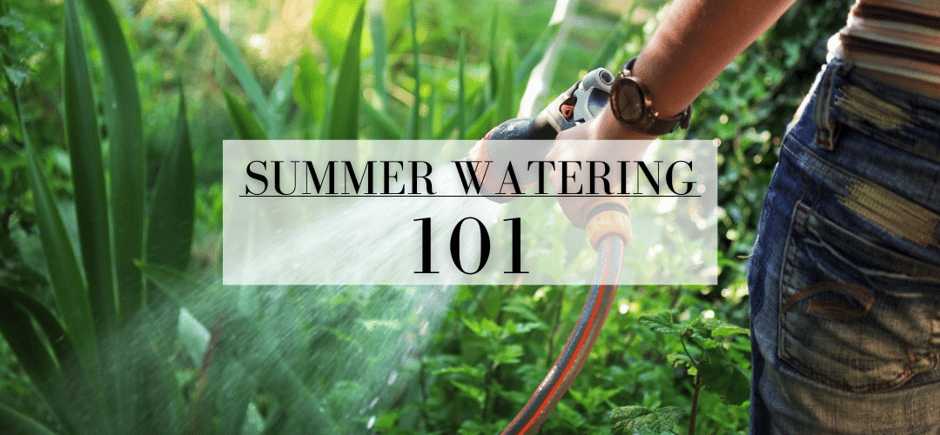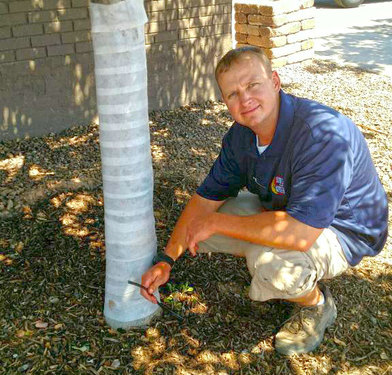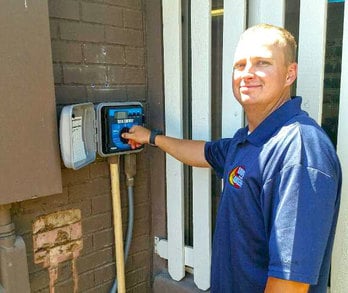
One of the biggest challenges and one of the most common questions we receive is understanding proper watering for the material in our landscape. As it begins to heat up it is important to get out into our yards and ensure that everything in the landscape is receiving ample water.
During the summer, higher temperatures can cause soils to dry out much faster, which increases the need for more water. Our nursery experts recommend increasing the amount of water your trees and plants receive June through August. Remember to continuously check the soil to avoid over/under-watering.
Our experts have put together a deep dive into the components and importance of understanding of your watering and irrigation schedule for your landscape.

There are four key components:
- WHERE to place the water
- HOW MUCH to apply
- HOW FAST to apply
- HOW OFTEN to apply
Factors that affect these components include weather, plant maturity, plant/tree type and soil type.
WHERE: Absorbing roots usually spread 1 1/2 to 3 times as wide as the canopy and are within 1 to 3 feet of the soil surface. IT IS IMPORTANT TO WATER THE ENTIRE ROOT ZONE EACH TIME YOU WATER.
HOW MUCH WATER: Apply enough water to wet the soil at least 1- 3 feet deep in the entire root zone. Use a pointed metal rod to test how deeply you have watered by inserting it into the ground soon after you irrigate. The rod will effortlessly slide through the wet soil and become difficult to push when it reaches the dry soil.
HOW FAST: Water should be applied only as quickly as it can be absorbed by the soil. Applying water too quickly causes erosion, wastes the water, and compacts the soil surface.
HOW OFTEN: The soil should be allowed to dry out between watering. The weather, plant/tree maturity, plant/tree type, soil type, and irrigation method are all key factors determining where to place the water, how much to apply and how often to apply water.
 WEATHER: Trees and plants in Texas require more water during the summer than they do during the rainy seasons. The high humidity and rain during the the rest of the year reduces the need for irrigation.
WEATHER: Trees and plants in Texas require more water during the summer than they do during the rainy seasons. The high humidity and rain during the the rest of the year reduces the need for irrigation.
PLANT MATURITY: Young and recently planted plants/trees should be watered more often than older more established plants/trees. Initially, water should be applied to the root ball and as the roots mature the water should be applied at the edge of the canopy and beyond.
PLANT TYPE: Fast-growing plants/trees need more water than slow-growing plants/trees. Many plants/trees are specially adapted to arid climates. Desert species need less water than subtropical/tropical varieties of plants/trees.
SOIL TYPE: Sandy soils absorb water quicker and drain promptly, so, water can be applied faster and must be applied more frequently. Clay soils absorb slowly and keep water more effectively. Water applied too rapidly to clay soils is wasted and causes erosion as it runs off so water slowly. If a plant/tree well has been built around the root zone to contain water then the water may be applied more quickly without fear of run-off.
IRRIGATION/WATERING METHODS
The type of watering method will determine how long it will take to adequately water your plants/trees.
DRIP IRRIGATION: Be sure to have enough well-placed emitters to cover the entire root ball. Program the system to run long enough to apply enough water to penetrate 2 feet.
BUBBLERS: Be sure the basins are level and extend beyond the width of the canopy.
FLOOD IRRIGATION: This is an excellent technique for developing deep-rooted trees.
HOSES: A perforated soaker house spread throughout the root zone is an effective device for watering trees and can be set under the mulch.
TIPS FOR EFFICIENT SUMMER WATERING:
- 3 to 4 inches of mulch applied under the canopy will keep soils cool, reduce water loss through evaporation and discourage weeds.
- The best time to water is in the morning or evening which reduces evaporation. DO NOT wet foliage as this can encourage fungus and mildew.
- Leach out salts from the root zone twice a year by applying MOON VALLEY SOIL & WATER CONDITIONER.
- Control weeds and turf grass that compete for your plants/trees water.
- Expand the area you water as the plant grows.
- Use MOON VALLEY NURSERY FERTILIZERS & NUTRIENTS for optimal growing in our region.

Submit a Comment